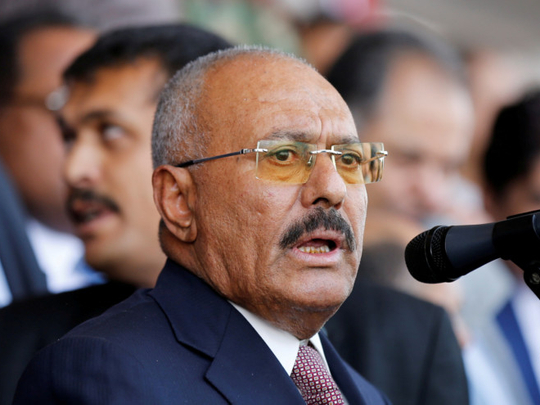
Dubai: The prodigal son has returned: strongman Ali Abdullah Saleh’s political swivel towards Riyadh could change the face and future of the war in Yemen, isolating his onetime Al Houthi allies.
Simmering resentment between Saleh and the militants over money, power-sharing and suspected backdoor dealings exploded at the weekend when the ex-president announced he was open to talks with Saudi Arabia and its allies, with whom he was once allied and against whom he has now fought for nearly three years.
Saleh-Al Houthi camp
The dissolution of the fraught Saleh-Al Houthi camp, predicted since its inception, and the subsequent shuffling of alliances in Yemen will play out as a definitive turning point in the conflict analysts say.
“There is no doubt this is a turning point, but it is not clear to where,” said April Longley Alley, an Arabian Peninsula researcher with the International Crisis Group.
“Battles in the capital are ongoing and they are poised to get worse. This could be a very bloody fight.”
For months, Saleh has hinted that he was unhappy with the growing power of Al Houthi “militias”, as he called them this weekend - in Sana’a.
The long-running rumours
Al Houthis, northern Yemenis with ties to Iran, have for months accused Saleh of backstabbing over what they suspected were covert meetings with Saudi Arabia, his former ally and Iran’s arch-nemesis.
The long-running rumours of hostility exploded in public in August, when the two accused each other of treason as their forces clashed in the streets of the capital.
Their ties took a serious turn for the worse in the months following and the militant alliance finally collapsed on Saturday, as Saleh announced he was ready to “turn the page” with the Saudi-led coalition, sparking words of welcome from Riyadh and threats of retribution from the Al Houthis.
The rift within militant ranks erupted on Wednesday and armed supporters of both sides continue to fight for key positions in Sana’a, raising fears of a new front in a three-year war that has claimed thousands of lives in Yemen and triggered what the UN has called the world’s worst humanitarian disaster.
But exactly what tipped the scales in Sana’a and what could happen now remain to be seen.
“Saleh’s desire to end this alliance has no doubt been encouraged by Saudi Arabia, which would have offered him a number of political promises in the run-up to the announcement,” said Laurent Bonnefoy, a Yemen expert at the Paris-based SciencesPo research centre.
“It is still unclear why Saleh chose to act now,” he added.
“Whatever his reasons, we are looking at a different war now.”
“The outcome depends on a number of intertwined factors, including the military position of Yemeni tribes around Sana’a, the ability of the republican guard to regroup under Saleh’s leadership, control over local media and the future actions of the Saudi coalition.”
Saleh, now 75, began his military career as a foot soldier and rapidly rose to the position of leader of unified Yemen, a position he once said was akin to “dancing on the heads of snakes”.
Saleh was elected president of North Yemen in 1978 and declared the first president of the unified Republic of Yemen in 1990, when the mainly Zaidi-Shiite north joined the mainly socialist south.
During his 33 years as president, he firmly consolidated both his power and enmity with Al Houthis, waging multiple wars against the northern armed militants as complaints of marginalisation echoed throughout southern Yemen.
Saleh was ousted in 2012 during Arab Spring protests. He ceded power to his vice-president Abd Rabbo Mansour Hadi amid international pressure.
But two years later, he suddenly joined forces with the Al Houthis, setting up their own government in Sana’a, severing (or suspending) ties with Saudi Arabia and driving out the Saudi-backed government of Hadi, who now lives in Riyadh.
The Hadi government, along with the Saudi-led coalition, have now hailed Saleh’s return to their fold.
Analysts say Saleh’s manoeuvre probably stems from his discontent with the rise of the Al Houthis in Sana’a.
“Since the beginning of their partnership, Al Houthis and Saleh have been unlikely and uncomfortable allies, bound together by common enemies but divided by deep ideological and political differences,” said Alley.
“Whatever happens with the current fight in Sana’a, a durable solution to the Yemen’s conflict must be a negotiated one that provides a political place and security for all sides. Excluding any one group is a recipe for more violence.”












